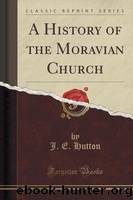A History of the Moravian Church (Classic Reprint) by J E Hutton

Author:J E Hutton [Hutton, J E]
Language: eng
Format: epub
Tags: Moravian Church -- History
ISBN: 9781330760017
Goodreads: 26964874
Publisher: Forgotten Books#PrB.rating#0.0
Published: 2015-09-27T00:00:00+00:00
CHAPTER IX. â MORAVIANS AND METHODISTS, 1735-1742.
For the origin of the Moravian Church in England we turn our eyes to a bookseller's shop in London. It was known as "The Bible and Sun"; it stood a few yards west of Temple Bar; and James Hutton, the man behind the counter, became in time the first English member of the Brethren's Church. But James Hutton was a man of high importance for the whole course of English history. He was the connecting link between Moravians and Methodists; and thus he played a vital part, entirely ignored by our great historians, in the whole Evangelical Revival.
He was born on September 14th, 1715. He was the son of a High-Church clergyman. His father was a non-juror. He had refused, that is, to take the oath of loyalty to the Hanoverian succession, had been compelled to resign his living, and now kept a boarding-house in College Street, Westminster, for boys attending the famous Westminster School. At that school little James himself was educated; and one of his teachers was Samuel Wesley, the elder brother of John and Charles. He had no idea to what this would lead. As the lad grew up in his father's home he had, of course, not the least suspicion that such a body as the Moravian Church existed. He had never heard of Zinzendorf or of Herrnhut. He was brought up a son of the Church of England; he loved her services and doctrine; and all that he desired to see was a revival within her borders of true spiritual life.
The revival was close at hand. For some years a number of pious peopleâsome clergy, and others laymenâhad been endeavouring to rouse the Church to new and vigorous life; and to this end they established a number of "Religious Societies." There were thirty or forty of these Societies in London. They consisted of members of the Church of England. They met, once a week, in private houses to pray, to read the Scriptures, and to edify each other. They drew up rules for their spiritual guidance, had special days for fasting and prayer, and attended early Communion once a month. At church they kept a sharp look-out for others "religiously disposed," and invited such to join their Societies. In the morning they would go to their own parish church; in the afternoon they would go where they could hear a "spiritual sermon." Of these Societies one met at the house of Hutton's father. If James, however, is to be believed, the Societies had now lost a good deal of their moral power. He was not content with the one in his own home. He was not pleased with the members of it. They were, he tells us, slumbering or dead souls; they cared for nothing but their own comfort in this world; and all they did when they met on Sunday evenings was to enjoy themselves at small expense, and fancy themselves more holy than other people. He was soon to meet with men of greater zeal.
Download
This site does not store any files on its server. We only index and link to content provided by other sites. Please contact the content providers to delete copyright contents if any and email us, we'll remove relevant links or contents immediately.
Kathy Andrews Collection by Kathy Andrews(11834)
The remains of the day by Kazuo Ishiguro(9000)
Spare by Prince Harry The Duke of Sussex(5197)
Paper Towns by Green John(5191)
The Body: A Guide for Occupants by Bill Bryson(5097)
Industrial Automation from Scratch: A hands-on guide to using sensors, actuators, PLCs, HMIs, and SCADA to automate industrial processes by Olushola Akande(5061)
Machine Learning at Scale with H2O by Gregory Keys | David Whiting(4313)
Be in a Treehouse by Pete Nelson(4051)
Never by Ken Follett(3957)
Harry Potter and the Goblet Of Fire by J.K. Rowling(3858)
Goodbye Paradise(3810)
The Remains of the Day by Kazuo Ishiguro(3413)
Into Thin Air by Jon Krakauer(3399)
Fairy Tale by Stephen King(3399)
The Cellar by Natasha Preston(3344)
The Genius of Japanese Carpentry by Azby Brown(3309)
120 Days of Sodom by Marquis de Sade(3275)
Reminders of Him: A Novel by Colleen Hoover(3121)
Drawing Shortcuts: Developing Quick Drawing Skills Using Today's Technology by Leggitt Jim(3083)
